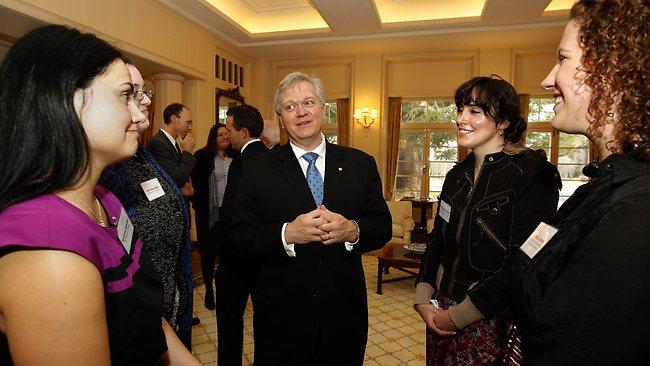It's patently clear: science vital in Asian Century
AUSTRALIA risks being left behind in the Asian Century if we don't take science and innovation more seriously.

AUSTRALIA risks being left behind in the Asian Century if we don't take science and innovation more seriously, Nobel prize-winner Brian Schmidt warns.
Professor Schmidt's concerns were reinforced by new government data that showed our neighbours had dramatically increased their spending on research and development across the past decade while Australia's productivity had gone backwards at the same time.
"When I first visited Australia in 1980 economically it was backward compared to the United States," Professor Schmidt told The Weekend Australian yesterday. "When I go to the United States now, honestly, in many respects Australia is ahead and we don't want to go back.
"But when the mining boom slows down something else is going to have to happen."
To avoid the trap of stagnation, he said, Australia must correct its poor record of translating basic research into products and other forms of innovation that help improve living standards.
Australians needed to elevate teaching and to see science as a worthy career path. "I don't like it when I hear people say my parents don't want me to become a scientist because it is a bad job.
"That is the part that hurts me because being a scientist is a great job, it is a wonderful thing."
Professor Schmidt was speaking after a high-level meeting of scientists, academics, industry chiefs, politicians and public servants held in his honour this week.
The round table was hosted by Governor-General Quentin Bryce at her residence in Yarralumla and moderated by former Treasury secretary Ken Henry.
The two hand-picked politicians in attendance were Labor's Andrew Leigh and NSW Liberal senator and former chief of staff to John Howard, Arthur Sinodinos.
The Weekend Australian was the only media invited on the understanding that we could report the essence of Tuesday's talks, but not quote any individuals involved.
The meeting heard that while Australia boasts world-class university research, it is below average on the thing that drives growth - innovation.
It is the gap between the lab and the market that Professor Schmidt believed was a critical reform topic in the Asian Century.
Apart from the health sector, researchers and industry tended not to collaborate in Australia.
"When I meet young people in health, they're thinking about how their stuff fits into not just companies but also the public health benefit.
"But in my area of physics, I would say my students would have never met anyone who has even met someone who is an innovator," Professor Schmidt said.
One of the most vexed topics discussed was Australia's failure to generate large numbers of patents. There was agreement that immigration rules were too tight at a time when Australia's high dollar allowed universities to poach the world's best brains.
But the high dollar was also a source of stress in the real economy with manufacturing the biggest victim.
Professor Schmidt said the government might need to offer loans to cover the grey area between an idea and its final application. The money could be repaid once a patent has generated income.
Treasury officials pointed out that federal and state budgets would be stretched for some years to come because revenue was weak.
Any new measures would have to be funded with new taxes or cuts to existing programs.
The Governor-General had asked Professor Schmidt to hold a national conversation on any issue he wished with a dream team of experts. Everyone in the room acknowledged the debate would need to run for a number of years.
Professor Schmidt was worried that Australia's political system was creeping down the road to US-style polarisation.
"When I was growing up in the United States, and even when I lived there 20 years ago, in general the political debate and discussion was about what was necessary to advance the nation. It was reasonable, it was sensible, it had teeth in it, people would agree on fundamental things which I think should have been agreed on.
"The way media and politics play together now there seems to be a strategy that it doesn't matter about the nation any more, it is really about getting into office. And maybe I'm being too cynical there but I certainly have seen the dumbing-down of debate on policies and ultimately thinking what is good for the nation.
"This has been exacerbated in the United States because the Right has become very Right and while the Left has sort of stayed where it was, the two groups do not work at all where they used to.
"And this had led to people being in politics who are not intellectuals in any way, they are really fundamentalists, and that scares me," he said.
But Australia had one very important thing going for it that the US lacked - an independent public service.
"Australia has a very strong public service that isn't politicised and you can see that people want to do the right thing. We don't want to lose that."



